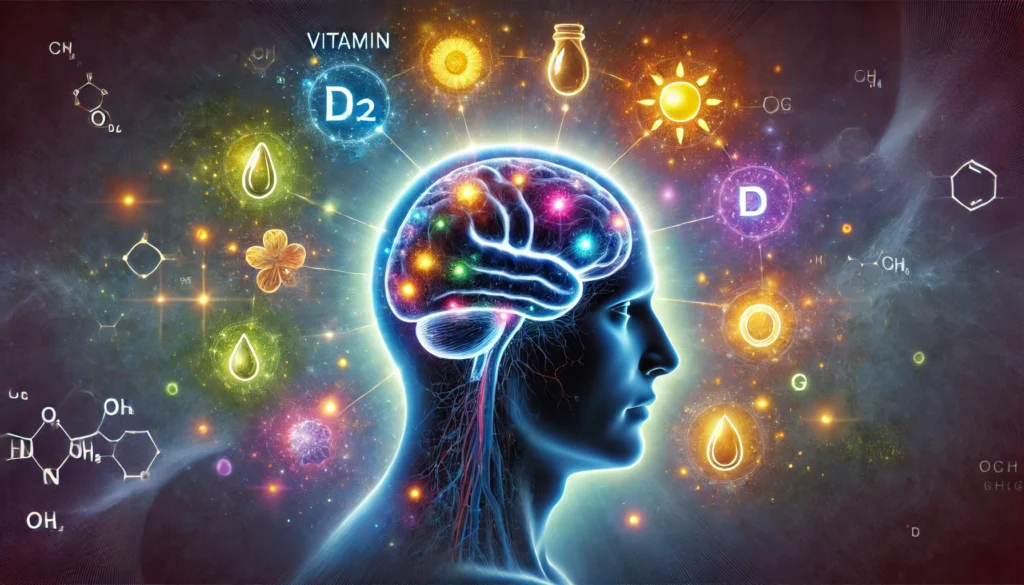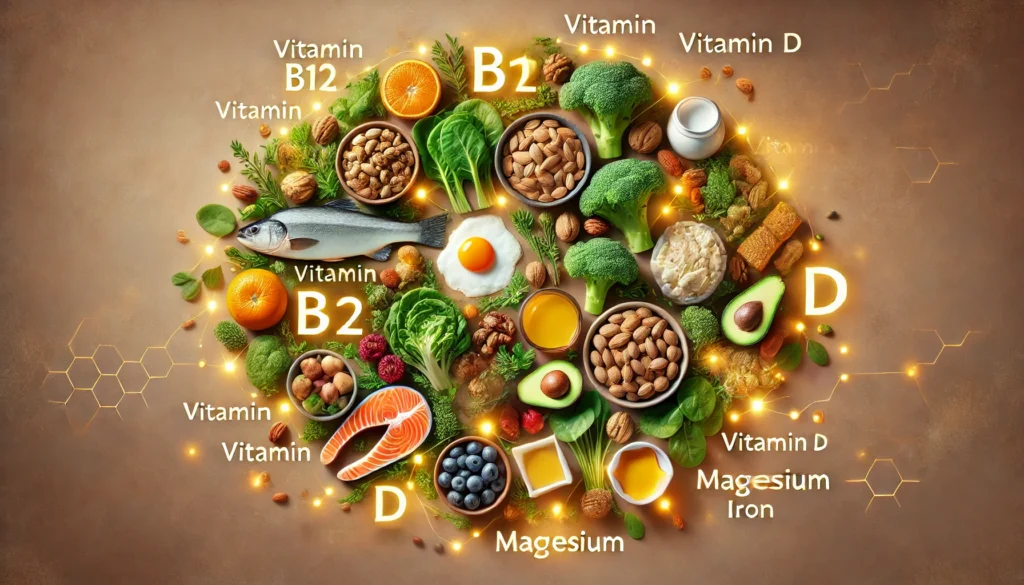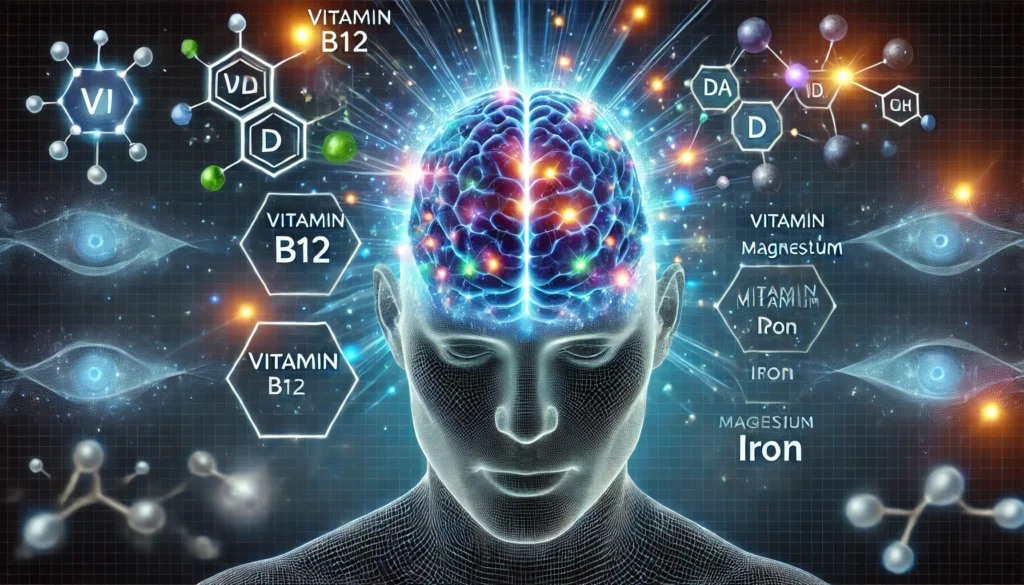Understanding Brain Fog: A Common but Misunderstood Condition
Brain fog is a term used to describe cognitive dysfunction characterized by confusion, forgetfulness, and a lack of mental clarity. While it is not a medical diagnosis on its own, it often serves as a symptom of underlying health conditions. Individuals experiencing brain fog may struggle with focus, experience difficulty recalling information, and feel mentally sluggish. This state of cognitive impairment can negatively impact productivity, mental health, and overall well-being.
You may also like: Understanding Cognitive Disorders: Types, Examples, and the Impact of Severe Cognitive Impairment
Nutritional deficiencies are one of the most overlooked causes of brain fog. The brain requires a steady supply of essential vitamins and minerals to function optimally, and when these nutrients are lacking, cognitive abilities may decline. Understanding which vitamin deficiencies contribute to brain fog and how to correct them through diet or supplementation is crucial for maintaining optimal mental performance.

The Role of Vitamin Deficiencies in Cognitive Function
Vitamins play a fundamental role in brain function. They support neurotransmitter production, aid in cellular energy production, and help combat oxidative stress, all of which are essential for maintaining mental clarity. When an individual lacks key vitamins, neural pathways may become less efficient, leading to symptoms such as difficulty concentrating, mental fatigue, and memory lapses. Certain vitamin deficiencies are more commonly associated with brain fog than others, making it critical to identify and address these nutritional gaps.
Among the most commonly implicated nutrients in brain fog are vitamin B12, vitamin D, magnesium, iron, and vitamin C. Each of these nutrients supports brain function in unique ways, and their deficiency can result in cognitive impairment.
Vitamin B12 and Brain Fog: A Critical Connection
Vitamin B12 is essential for neurological function and red blood cell production. It plays a vital role in the synthesis of myelin, the protective coating around nerves, which ensures efficient signal transmission between neurons. When vitamin B12 levels are low, nerve function can deteriorate, leading to cognitive impairment.
A deficiency in vitamin B12 is one of the most common causes of brain fog, particularly among individuals who follow plant-based diets, as B12 is primarily found in animal products. Symptoms of vitamin B12 deficiency brain fog include forgetfulness, difficulty focusing, mental fatigue, and even mood disturbances such as depression and irritability.
Low levels of vitamin B12 can also lead to anemia, which further contributes to cognitive dysfunction. Anemia-related brain fog occurs because insufficient red blood cells reduce oxygen delivery to the brain, resulting in mental sluggishness and fatigue. Increasing B12 intake through foods such as eggs, dairy, and fortified cereals, or through supplementation, can help restore cognitive clarity.
Can Low Vitamin D Cause Brain Fog?
Vitamin D is well known for its role in bone health, but its importance in cognitive function is often underestimated. The brain has numerous vitamin D receptors, and this nutrient is involved in neurotransmitter production and neuroprotection.
A deficiency in vitamin D can lead to brain fog, as well as symptoms such as depression, fatigue, and poor concentration. Research has shown that individuals with low vitamin D levels often report feeling mentally sluggish and have a higher risk of developing neurodegenerative diseases.
Vitamin D deficiency brain fog is particularly common in individuals who spend little time outdoors, as the body synthesizes vitamin D from sunlight exposure. Additionally, people with darker skin tones, older adults, and those with gastrointestinal conditions that affect nutrient absorption are at a greater risk of deficiency. Ensuring adequate vitamin D intake through sun exposure, fatty fish, fortified dairy products, or supplements can help improve mental clarity and cognitive function.
The Impact of Magnesium on Cognitive Function
Magnesium is a crucial mineral for brain health, involved in over 300 enzymatic reactions in the body, including those responsible for neurotransmitter function and synaptic plasticity. When magnesium levels are low, individuals may experience symptoms such as irritability, headaches, and cognitive impairment.
Magnesium brain fog is a common issue, particularly in individuals who consume high levels of processed foods, as these foods are often stripped of essential nutrients. Studies have shown that magnesium deficiency can contribute to memory problems, difficulty concentrating, and increased susceptibility to stress.
Fortunately, addressing magnesium deficiency is relatively straightforward. Foods rich in magnesium include leafy greens, nuts, seeds, and whole grains. For individuals who struggle to meet their magnesium needs through diet alone, supplementation may be beneficial. Some forms of magnesium, such as magnesium glycinate, are particularly effective for cognitive support and relaxation.
Can Iron Deficiency Cause Brain Fog?
Iron is essential for oxygen transport in the blood, and a deficiency in this mineral can lead to anemia, a condition characterized by fatigue and reduced cognitive function. Anemia brain fog occurs because the brain does not receive enough oxygen, impairing neural activity and reducing mental sharpness.
Individuals most at risk of iron deficiency include menstruating women, vegetarians, and those with gastrointestinal disorders that impair nutrient absorption. Symptoms of iron deficiency brain fog include dizziness, difficulty concentrating, and persistent fatigue.
Increasing iron intake through foods such as red meat, lentils, spinach, and fortified cereals can help improve cognitive function. Additionally, consuming vitamin C-rich foods alongside iron sources enhances absorption, further supporting brain health.
Vitamin C and Brain Fog: The Overlooked Connection
Vitamin C is a powerful antioxidant that plays a role in neuroprotection and neurotransmitter synthesis. Low vitamin C levels have been linked to cognitive decline, increased oxidative stress, and poor memory function.
Vitamin C brain fog occurs when the brain does not receive adequate antioxidant protection, leading to increased inflammation and oxidative damage. This can result in sluggish thinking, mood disturbances, and difficulty processing information.
Consuming vitamin C-rich foods such as citrus fruits, bell peppers, and strawberries can help support cognitive function. For individuals with difficulty obtaining sufficient vitamin C from their diet, supplementation can be an effective way to combat brain fog and enhance mental clarity.
What Supplements Cause Brain Fog? Understanding Potential Triggers
While certain supplements can help alleviate brain fog, others may inadvertently contribute to cognitive impairment. Some common culprits include excessive vitamin D supplementation, high doses of magnesium in poorly absorbed forms, and unbalanced B vitamin intake.
For instance, can magnesium cause brain fog? In some cases, yes—particularly when taken in excessive amounts or in forms that the body struggles to absorb. Similarly, while vitamin D is essential for cognitive function, excessive supplementation can lead to calcium imbalances, which may negatively impact brain function.

Frequently Asked Questions (FAQ) on Vitamin Deficiency and Brain Fog
1. What deficiency causes brain fog, and how does it affect cognitive function?
A deficiency in essential vitamins and minerals can significantly contribute to brain fog, impacting memory, concentration, and mental clarity. One of the most common causes of brain fog vitamin deficiency is low levels of vitamin B12, which is crucial for maintaining nerve function and producing red blood cells. Inadequate levels of vitamin D, magnesium, and iron can also result in sluggish cognitive processing and chronic fatigue. When the brain lacks these key nutrients, neurotransmitter function is disrupted, leading to difficulties in problem-solving and information retention. Ensuring a well-balanced diet rich in these vitamins can improve mental sharpness and help alleviate symptoms of brain fog.
2. Can low iron cause brain fog, and what are the signs to watch for?
Yes, low iron levels can lead to anemia brain fog, which manifests as persistent fatigue, difficulty focusing, and a sense of mental sluggishness. Iron plays a crucial role in oxygen transport, and when levels are insufficient, the brain may not receive enough oxygen to function optimally. Symptoms of iron deficiency-related brain fog include dizziness, headaches, irritability, and forgetfulness. Women, particularly those with heavy menstrual cycles, as well as vegetarians and vegans, are more prone to iron deficiency and should monitor their dietary intake closely. Consuming iron-rich foods like spinach, lentils, and red meat, or taking supplements under medical guidance, can help restore optimal cognitive function.
3. Does magnesium help with brain fog, and how does it support cognitive health?
Magnesium is a vital mineral for brain function, and its deficiency can contribute to memory issues, poor concentration, and increased stress levels. Magnesium brain fog occurs because this mineral is necessary for neurotransmitter regulation, synaptic plasticity, and overall nervous system health. Additionally, magnesium supports relaxation by modulating the body’s stress response, reducing cortisol levels that may contribute to mental fatigue. Studies suggest that adequate magnesium intake may enhance cognitive flexibility and protect against neurodegenerative diseases. To prevent magnesium brain fog, incorporate magnesium-rich foods like nuts, seeds, and leafy greens into your diet or consider supplementation if dietary intake is insufficient.
4. Can vitamin D deficiency cause brain fog, and what are its broader cognitive effects?
Yes, vitamin D deficiency brain fog is a well-documented issue that arises when the body lacks sufficient levels of this essential nutrient. Low vitamin D levels are associated with reduced neurotransmitter activity, leading to impaired focus, mood disturbances, and cognitive decline. Since vitamin D plays a crucial role in neuroprotection and inflammation regulation, a deficiency can exacerbate conditions like depression and anxiety, which further contribute to brain fog. Individuals with low vitamin D and brain fog often report feeling mentally drained and unable to process information effectively. Sun exposure, fortified foods, and vitamin D supplements can help restore balance and improve cognitive clarity.
5. Can magnesium cause brain fog, or does it only help alleviate it?
While magnesium is generally beneficial for cognitive function, an imbalance—either too little or too much—can contribute to brain fog. Excessive magnesium intake, especially from supplements, may lead to symptoms such as lethargy, confusion, and drowsiness. On the other hand, insufficient magnesium levels can contribute to stress-induced cognitive decline, making it important to maintain an optimal balance. If you suspect magnesium brain fog, consider adjusting your intake based on dietary habits and lifestyle factors. Consulting a healthcare provider can help determine the right dosage to support brain health without adverse effects.
6. What supplements cause brain fog, and how can you identify them?
Certain supplements, while beneficial for general health, can paradoxically lead to brain fog if taken inappropriately. For example, excessive vitamin D supplementation without sufficient magnesium can result in calcium buildup in the bloodstream, contributing to cognitive sluggishness. High doses of iron supplements, particularly in individuals without anemia, can cause oxidative stress, leading to fatigue and mental confusion. Some herbal supplements, such as valerian root and melatonin, may also cause drowsiness and impair cognitive function when taken in high amounts. It’s essential to research each supplement’s effects and consult a healthcare provider before starting any new regimen to avoid unwanted cognitive side effects.
7. Can vitamin C help with brain fog, and what role does it play in mental clarity?
Vitamin C brain fog is a lesser-known phenomenon, but this vitamin is crucial for brain health due to its antioxidant properties and its role in neurotransmitter synthesis. A deficiency in vitamin C can lead to increased oxidative stress in the brain, resulting in sluggish thinking, poor memory retention, and heightened susceptibility to mental fatigue. Additionally, vitamin C supports immune function, which indirectly affects cognitive performance by reducing inflammation and promoting faster recovery from illnesses that may contribute to brain fog. Including vitamin C-rich foods such as citrus fruits, bell peppers, and strawberries in your diet can enhance cognitive clarity and prevent deficiencies.
8. How long does it take to recover from vitamin D deficiency brain fog?
The recovery time for brain fog due to vitamin D deficiency varies depending on the severity of the deficiency and how quickly levels are restored. Some individuals experience improvement within a few weeks of increasing their vitamin D intake, while others may need several months to regain full cognitive function. Factors such as age, metabolism, and underlying health conditions influence how quickly the body absorbs and utilizes vitamin D. Many individuals report that vitamin D cured my brain fog after consistent supplementation and lifestyle adjustments, such as spending more time outdoors. To accelerate recovery, it’s beneficial to combine vitamin D intake with adequate magnesium, as both nutrients work synergistically.
9. Does B12 help with brain fog, and what are the best sources of this vitamin?
Vitamin B12 is essential for cognitive function, and a deficiency can lead to significant neurological symptoms, including brain fog, memory loss, and difficulty concentrating. Many individuals with vitamin B12 and brain fog experience improvement after correcting their deficiency through diet or supplementation. Since B12 is primarily found in animal products, vegetarians and vegans are at a higher risk of deficiency and may need fortified foods or supplements. Good dietary sources of B12 include eggs, dairy products, fish, and poultry. Regular monitoring of B12 levels, particularly in older adults and those with digestive disorders, can help prevent cognitive decline associated with deficiency.
10. Can low vitamin D cause brain fog even if other vitamin levels are normal?
Yes, even if other nutrient levels are adequate, low vitamin D can still contribute to persistent brain fog. Vitamin D plays a unique role in regulating calcium homeostasis, neuroinflammation, and neurotransmitter function, all of which are essential for clear cognitive processing. Individuals experiencing low vitamin D and brain fog may struggle with chronic fatigue, irritability, and difficulty processing new information. Unlike other vitamin deficiencies, low vitamin D often develops gradually and may go unnoticed for long periods, making it important to monitor levels through regular blood tests. Increasing sun exposure and consuming fortified foods can help restore vitamin D levels and alleviate brain fog symptoms.

Conclusion: Addressing Brain Fog Through Nutritional Balance
Brain fog can be frustrating and debilitating, but identifying and correcting vitamin deficiencies can significantly improve cognitive function. Ensuring adequate intake of essential nutrients such as vitamin B12, vitamin D, magnesium, iron, and vitamin C can help alleviate symptoms and restore mental clarity.
Individuals experiencing persistent brain fog should consider evaluating their diet and lifestyle to identify potential deficiencies. A balanced diet rich in whole foods, along with targeted supplementation when necessary, can play a vital role in maintaining optimal brain health. By addressing nutritional gaps, individuals can enhance cognitive performance, boost energy levels, and achieve better overall mental well-being.
mental clarity supplements, cognitive health vitamins, brain fatigue remedies, focus and concentration boosters, natural ways to improve memory, nutrient deficiencies and brain function, essential minerals for mental energy, how to enhance cognitive performance, fatigue and low vitamin levels, best diet for mental sharpness, neurological health and nutrition, brain fog recovery tips, vitamins for better brain function, micronutrient balance for cognition, overcoming mental sluggishness, how to prevent memory lapses, natural ways to support brain health, effects of poor nutrition on cognition, role of antioxidants in brain health, improving brain function naturally
Further Reading:
6 Best Evidence-Based Supplements for Brain Fog
Can Certain Nutrient Deficiencies Cause Brain Fog?
These Key Vitamins Can Help Combat Brain Fog
Important Note: The information contained in this article is for general informational purposes only, and should not be construed as health or medical advice, nor is it intended to diagnose, prevent, treat, or cure any disease or health condition. Before embarking on any diet, fitness regimen, or program of nutritional supplementation, it is advisable to consult your healthcare professional in order to determine its safety and probable efficacy in terms of your individual state of health.
Regarding Nutritional Supplements Or Other Non-Prescription Health Products: If any nutritional supplements or other non-prescription health products are mentioned in the foregoing article, any claims or statements made about them have not been evaluated by the U.S. Food and Drug Administration, and such nutritional supplements or other health products are not intended to diagnose, treat, cure, or prevent any disease.


